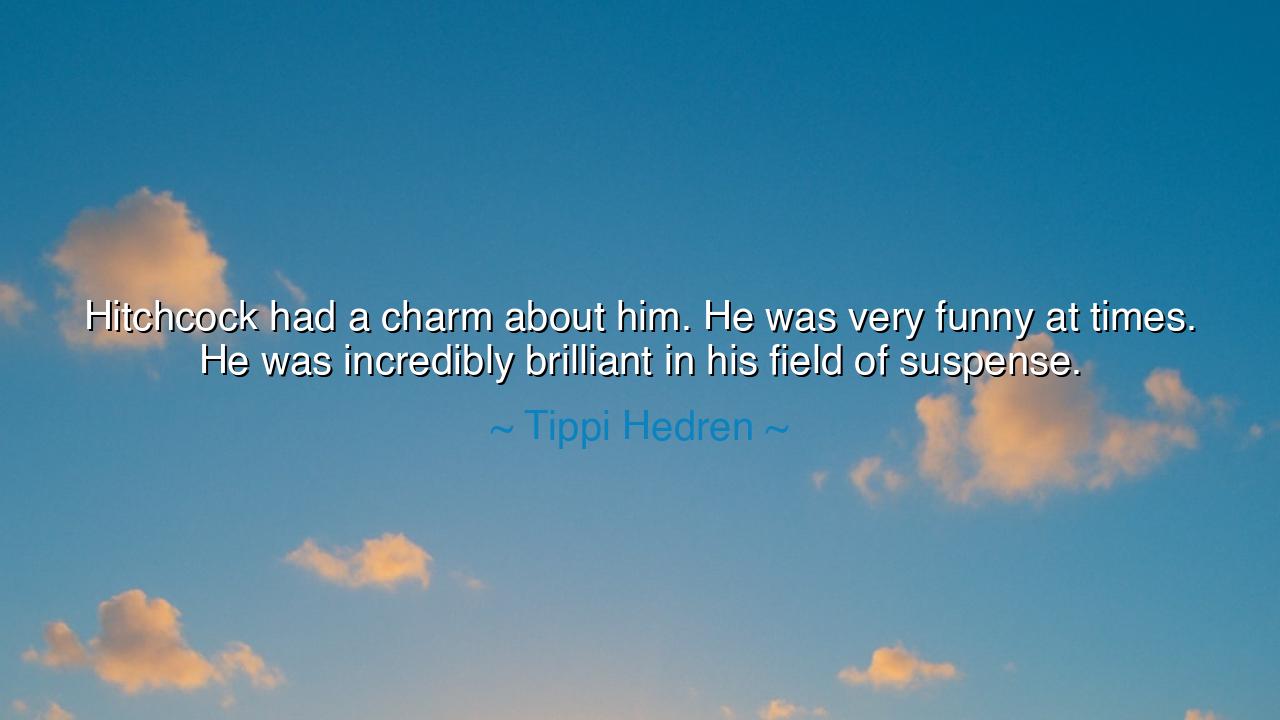
Hitchcock had a charm about him. He was very funny at times. He
Hitchcock had a charm about him. He was very funny at times. He was incredibly brilliant in his field of suspense.






“Hitchcock had a charm about him. He was very funny at times. He was incredibly brilliant in his field of suspense.” — so spoke Tippi Hedren, who once walked in the shadow and light of one of cinema’s most enigmatic masters. Her words are simple, yet beneath their calm surface runs a river of admiration, complexity, and reverence. They are not merely a reflection upon a man, but upon the dual nature of genius itself — that it can be both light and shadow, warmth and fear, laughter and tension. In these few phrases, Hedren unveils a truth the ancients knew well: that brilliance often carries within it the fire that both creates and consumes.
To say that Hitchcock possessed charm is to speak of the strange magnetism that draws others toward greatness, even when it unsettles them. The ancients would have said he was “touched by the Muse,” guided by forces unseen, shaping the unseen into story and emotion. His charm was not the fleeting kind found in flattery or ease, but the deeper charm of vision — the aura of one who sees the world differently. This kind of presence commands attention, even from those who do not fully understand it. It is the charm of the storm before lightning strikes, the calm hand of a master sculptor before the chisel falls.
Hedren also tells us he was funny, and here lies a paradox worthy of reflection. How could the master of suspense, the orchestrator of terror and unease, also carry humor in his heart? Yet this, too, is a mark of wisdom. For the ancients believed that laughter and fear are twin threads woven into the same tapestry of life. A man who can make others laugh understands rhythm; a man who can make others tremble understands timing. Hitchcock’s humor was not separate from his art — it was its counterbalance, the wink of the creator behind the curtain, reminding us that life’s tension is bearable only when shadow is tempered by light.
When Hedren calls him brilliant, she speaks not merely of skill, but of the sacred craft of mastery. True brilliance is more than intellect — it is the fusion of vision and discipline, imagination and structure. Hitchcock’s art was the art of anticipation, the unseen, the moment before revelation. Like an ancient oracle, he understood that fear is not in what is shown, but in what the mind imagines. The ancients taught that suspense is the soul’s recognition of fate — the awareness that something is coming, that destiny waits just beyond the door. Hitchcock gave that feeling form, weaving human psychology into every frame until audiences trembled not from monsters, but from themselves.
There is a lesson here for all who seek excellence. The field of suspense was Hitchcock’s temple, and within it he labored as priest and prophet. He studied the pulse of the audience as a healer studies the body. He learned how long silence could stretch before it breaks, how a single glance could speak louder than words. His brilliance was not accident — it was craft, born of patience and observation. Like the artisans of old who built cathedrals stone by stone, he built emotion frame by frame, crafting fear not to torment, but to awaken.
Yet Tippi’s words carry another layer — the tone of one who has stood close to genius and felt both its warmth and its shadow. For the ancients also knew that proximity to great power is never simple. To work beside brilliance is to risk being consumed by its flame. Many who serve the great find themselves shaped by it — scarred, perhaps, but also illuminated. Hedren’s remembrance, spoken with grace, reminds us that even in complexity there is reverence. To acknowledge both the charm and the challenge of such a man is to honor truth, not myth.
And so, the teaching is this: Honor the masters, but do not worship them. Learn from their balance of humor and gravity, of intelligence and intuition. Seek to cultivate your own charm, your own brilliance, in the field that calls to you. For greatness is not born in thunder, but in the steady rhythm of those who study, create, and dare to look deeper than others. Be both light and shadow, laughter and silence, heart and craft. In this way, you too may walk the path of the brilliant — not by imitation, but by awakening the genius that already slumbers within your own soul.






AAdministratorAdministrator
Welcome, honored guests. Please leave a comment, we will respond soon